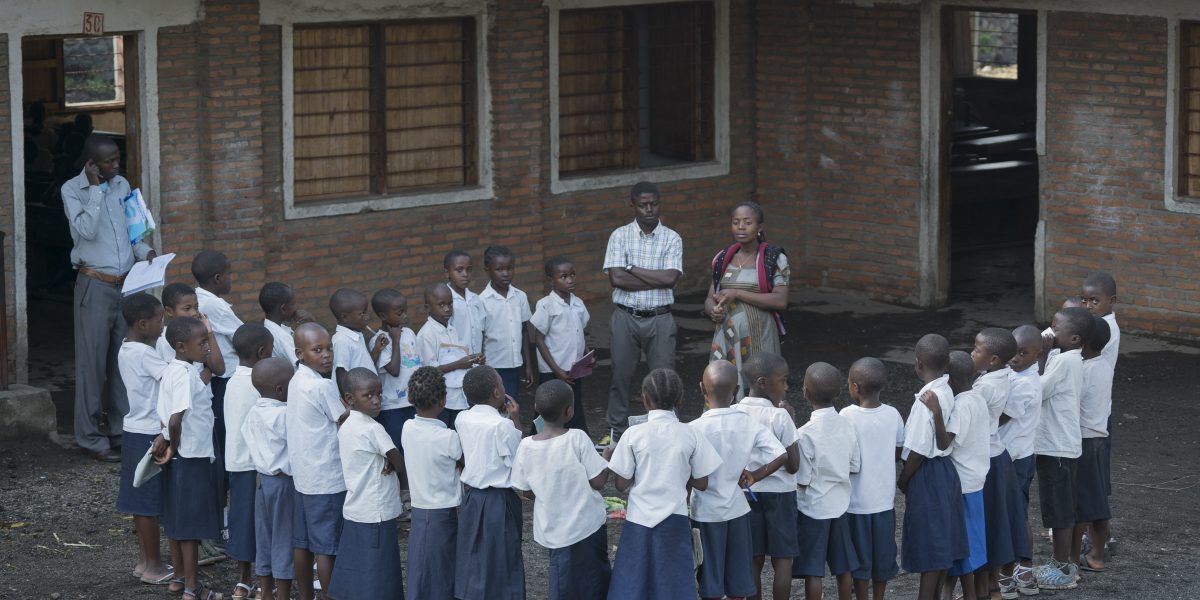JRS Responds to Escalating Conflict in the Democratic Republic of Congo
19 December 2023|Chloe Gunther

After more than two decades of conflict in the Democratic Republic of Congo (DRC), violence has escalated between the government and armed groups in the last two years. Today, over 6 million people are estimated to be internally displaced in a country that already hosts hundreds of thousands of refugees from neighboring countries like Rwanda, the Central African Republic (CAR), South Sudan, and Burundi.
Jesuit Refugee Service (JRS) is in Goma, the capital of the North Kivu Province in the DRC. Victor Setibo is the Country Director, and he recently took the time to discuss the current situation in the DRC, what refugees and internally displaced people are experiencing, and how JRS is accompanying the people there due to a generous grant from the Ladies of Bethany.
Victor himself is from the DRC and returned to his home country after entering the Jesuits for a period of time. During his formation he earned a master’s degree in theology from the University of California Berkeley. He discerned with his provincial to transition out of the Jesuits yet opted to work for JRS.
“I was moved by the desire to know what was happening and integrating into JRS after leaving the Jesuits allowed for a smooth transition and for me to continue the work I am passionate about,” he said. Victor served two years respectively as the Education Coordinator, Psychosocial Coordinator, and Project Director with JRS in Masisi (another town in North Kivu Province), then he transitioned to working in CAR, as the Project Director in Bambari for two years and half and Assistant Program Officer for six months, until he ultimately moved back to Goma where he serves as Country Director for the DRC.
Goma borders Lake Kivu and Rwanda. “It is near Goma that violence has escalated,” Victor said. “[The fighting] is about 30 kilometers away causing thousands of internally displaced people, but so far Goma is still safe, we cannot yet hear any of the gunfire,” he said. “We are dealing with a very complex and persistent humanitarian crisis.”
Over a million people displaced in North Kivu Province and around Goma need basic survival materials including food, safe water, shelter, and emergency medical attention. “Humanitarian organizations are overwhelmed by situations around the world and people they need to attend to,” Victor said. “Organizations here are doing the best they can.”
JRS partners with several humanitarian organizations to address concerns in the community. A primary focus of JRS DRC is education in emergencies. Amidst the intense violence, school buildings are destroyed. JRS, in partnership with UNICEF, has set up a system which allows children in displacement to continue their education in Temporary Learning Spaces.
JRS DRC is also actively finding ways to make their education programs more accessible. Girls are encouraged to pursue higher education and even receive training to become teachers themselves. The goal is that one day they can return and teach the next generation of Congolese women in remote areas.
“It is so important that girls see themselves represented and have role models in their classroom,” Victor said. JRS also provides young women with menstrual hygiene kits to reduce the barriers that keep women and girls from attending class.
Women and girls in the DRC who are survivors of sexual and gender-based violence (SGBV) do a lot of work to heal from these devastating experiences. Victor noted how JRS accompanies women throughout this healing. “The voices of these girls and women are not heard, but we are championing that change.”
When Pope Francis met with survivors from the DRC earlier this year, a woman from the JRS community was present. This was one of several efforts to increase advocacy work and awareness around SGBV in the country.
JRS DRC also incorporates mental health and psychosocial support (MHPSS) into learning environments for both students and their teachers. “Teachers are also displaced so we have training to help people care for their own psychosocial well-being,” Victor said.
Looking towards the future, Victor is hoping he and the JRS team can implement a more structured, social cohesion program to help the community in Goma strengthen relationships between different ethnic and cultural groups. “We have a wounded society here that needs healing,” Victor said. His hope is that if people have more understanding for where one another comes from and each one’s expected contribution for peace and development, this tension will ease.
“Sometimes we can feel kind of stuck, we ask ourselves, what is the way out? This violence has been happening for many years and the cycle just continues itself.” Right now, Victor explained, he feels like he and his team are just able to respond to the effects and consequences of corrupt politics and violence. They must focus on emergency response, but his goal is that one day the JRS team will be able to go beyond and create programs that pave a pathway towards sustainable change.
“You can lose hope,” he said, “but if you ask yourself what the immediate problem is you can look for solutions.” He sees the impacts and direct results of JRS’s work on a closer, more interpersonal level. “When you meet a child and hear how access to education has changed their lives, you can understand the real-life impact, there is something very powerful that emerges from that.”
The DRC is set to hold presidential elections tomorrow (December 20th). Victor believes that if these elections are conducted honestly, the Congolese people, informed by their past experiences, will elect genuine leaders who might be able to lead the path to peace.
“If we can vote, and our votes are heard, we can make a change,” Victor said. Regardless of the outcome, JRS DRC will continue walking with refugees and those who are internally displaced, accompanying and serving them as they seek a better future.



